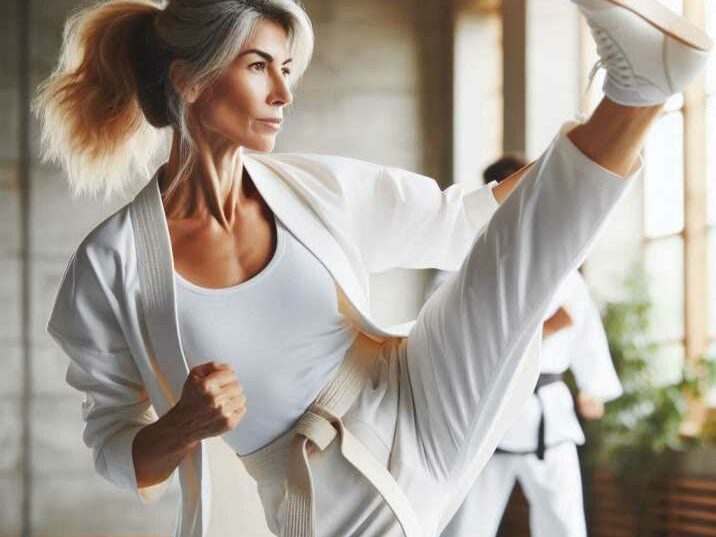Thinking about starting martial arts at 40? You’re not alone. In fact, many people are turning to martial arts later in life for a variety of reasons. Whether it’s for fitness, self-defense, or simply a new challenge, martial arts offer numerous benefits. This blog will guide you through everything you need to know about starting martial arts at 40, from the advantages and challenges to the best disciplines for beginners.

Why Consider Martial Arts at 40?
Table of Contents
Improved Physical Fitness
One of the most significant benefits of martial arts is physical fitness. At 40, maintaining good health becomes even more crucial. Martial arts at 40 training helps in improving strength, flexibility, and endurance. Regular practice can lead to weight loss, better cardiovascular health, and increased muscle tone.
Mental Well-being
Martial arts are not just about physical strength; they’re also about mental fortitude. Practices like meditation and mindfulness, often incorporated into martial arts training, can help reduce stress and improve mental clarity. The discipline and focus required can also enhance your decision-making skills and overall mental resilience.
Building a Community
Joining a martial arts at 40 can introduce you to a new community. You’ll meet people who share similar interests and goals, creating a support system that can make your training more enjoyable and sustainable. The camaraderie and friendships formed can be a significant motivator.
Debunking Myths About Starting Martial Arts Later in Life
It’s Too Late to Start
Many people believe that martial arts are only for the young. However, this is a myth. While starting younger can offer a longer time to practice and master techniques, starting Martial Arts at 40 is entirely feasible. With the right mindset and approach, age can even be an advantage, bringing maturity and patience to your training.
You Need Prior Experience
Another common misconception is that you need some background in martial arts or sports. While having a fitness background can help, it’s not a prerequisite. Many martial arts schools offer beginner classes tailored for adults with no prior experience, ensuring you can start from scratch comfortably.
Risk of Injury is High
While there is always a risk of injury in any physical activity, martial arts training for adults often focuses on safety. Instructors are trained to modify exercises to suit different fitness levels and ages, reducing the risk of injury. Proper warm-up and cool-down routines further minimize these risks.
Choosing the Right Martial Art for You
Karate
Karate is an excellent choice for beginners. It focuses on striking techniques such as punches, kicks, and knee strikes. The discipline also emphasizes mental toughness and respect, making it a holistic practice. Karate classes often start with fundamental techniques, ensuring you can progress at your own pace.
Taekwondo
Taekwondo is known for its high-flying kicks and fast-paced movements. It’s a fantastic way to improve your flexibility and agility. Classes are structured to accommodate all skill levels, and the belt system offers clear progression goals, keeping you motivated.
Brazilian Jiu-Jitsu
If you’re interested in grappling and ground fighting, Brazilian Jiu-Jitsu (BJJ) might be the martial art for you. BJJ focuses on submission holds and leverage, making it suitable for people of all ages and sizes. The supportive community and emphasis on technique over brute strength make it accessible for older beginners.
Aikido
Aikido focuses on using an opponent’s energy against them, making it a low-impact martial art. This discipline emphasizes fluid movements and joint locks, making it suitable for those who may be concerned about high-impact training. Aikido also promotes relaxation and stress relief, enhancing mental well-being.
Preparing for Your First Class
Physical Preparation
Before starting martial arts, it’s essential to prepare your body. Basic exercises like running, stretching, and strength training can help condition your body for the demands of martial arts. Ensure you’re also eating a balanced diet to fuel your training sessions.
Mental Preparation
Mental readiness is just as important as physical preparation. Setting clear goals can help keep you motivated. Whether it’s improving your fitness, learning self-defense, or achieving a particular belt level, having a goal will guide your training efforts.
Choosing the Right School
Researching and choosing the right martial arts school is crucial. Look for schools with certified instructors who have experience teaching adults. Attend a few trial classes to get a feel for the environment and teaching style. Ensure the school promotes a safe and inclusive atmosphere.
Benefits Beyond the Dojo
Self-Defense Skills
Learning martial arts equips you with practical self-defense skills. Knowing how to protect yourself can boost your confidence and give you peace of mind. Techniques learned in class can be effective in real-life situations, providing an added layer of personal security.
Stress Relief
The physical exertion and mental focus required in martial arts make it an excellent stress reliever. The endorphins released during training can improve your mood and reduce anxiety. The discipline and routine of regular practice can also provide a sense of stability and calm in your daily life.
Enhanced Focus and Discipline
Martial arts training requires a high level of focus and discipline. These skills are not only beneficial in the dojo but also in everyday life. Improved concentration can enhance your work performance, while discipline can help you achieve personal goals more effectively.
Stories of Success
Jane’s Journey
Jane started Taekwondo at 42. Initially, she was apprehensive about her ability to keep up with younger classmates. However, with consistent practice and support from her instructors, she progressed rapidly. Today, she holds a black belt and teaches beginner classes, inspiring others to start their martial arts journey.
Mark’s Transformation
Mark, a 45-year-old office worker, took up Brazilian Jiu-Jitsu to improve his fitness. Over time, he not only lost weight but also gained a sense of community and purpose. The techniques he learned boosted his confidence, and he now actively participates in local competitions.
Linda’s New Lease on Life
At 47, Linda began practicing Aikido to reduce stress. The fluid movements and focus on mindfulness helped her manage anxiety and improve her overall well-being. She now advocates for older adults to explore martial arts as a means of physical and mental health improvement.
Conclusion
Starting martial arts at 40 is not only possible but also incredibly beneficial. From improved physical fitness and mental well-being to building a supportive community, the advantages are numerous. By choosing the right martial art and preparing adequately, you can embark on a rewarding and enriching journey.
Ready to get started? Join a class today and discover the life-changing benefits of martial arts. For personalized guidance and to find the best martial arts schools in your area, sign up for our newsletter. Let’s make this your year of transformation!
Frequently Asked Questions
Is 40 too old to start martial arts?
No, 40 is not too old to start martial arts. Many people begin their martial arts journey later in life and find it highly rewarding.
How often should I train?
It’s recommended to start with 2-3 classes per week. This frequency allows your body to adapt to the new physical demands without overexertion.
What should I wear to my first class?
Wear comfortable, loose-fitting clothing that allows for a full range of motion. Most schools will provide specific uniforms once you enroll.
Will martial arts help me lose weight?
Yes, martial arts can be an effective way to lose weight. The rigorous physical activity involved can burn calories and improve overall fitness.
Can I practice martial arts if I have a medical condition?
It’s essential to consult your doctor before starting martial arts if you have any medical conditions. Many schools can modify training to accommodate health concerns, ensuring a safe practice environment.


